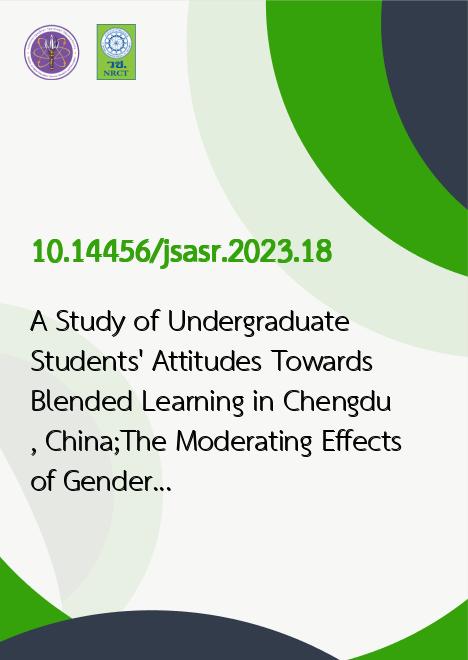
|
A Study of Undergraduate Students' Attitudes Towards Blended Learning in Chengdu, China;The Moderating Effects of Gender, Disciplines and Social Influences |
|---|---|
| รหัสดีโอไอ | |
| Creator | Xinyue Li |
| Title | 1. A Study of Undergraduate Students' Attitudes Towards Blended Learning in Chengdu, China 2. The Moderating Effects of Gender, Disciplines and Social Influences |
| Publisher | DR.KEN Institute of Academic Development and Promotion. |
| Publication Year | 2566 |
| Journal Title | International Journal of Sociologies and Anthropologies Science Reviews |
| Journal Vol. | 3 |
| Journal No. | 2 |
| Page no. | 71-86 |
| Keyword | Blended Learning, Attitude, Engineering, Gender, Social Influence |
| URL Website | https://so07.tci-thaijo.org/index.php/IJSASR/about |
| Website title | https://so07.tci-thaijo.org/index.php/IJSASR/article/view/2552 |
| ISSN | 2774-0366 |
| Abstract | Background and Aim: With the end of COVID-19, Chinese universities are returning to offline teaching and learning and looking to blended learning and digitization as the way forward. To better engage learners in the future of blended learning, it is necessary to understand the internal dynamics that drive learner engagement.Materials and Methods: This study is based on social cognitive theory and focuses on the factors that influence learners' attitudes toward participating in blended learning. The study collected information on perceived usefulness, satisfaction, self-efficacy, and attitudes towards blended learning and demographic characteristics from five hundred university students using a five-point Likert questionnaire, and the data collected was quantitatively analyzed using SPSS.Results: This study found that the students’ perceived usefulness, satisfaction, and self-efficacy could significantly influence their attitudes towards blended learning, while gender, discipline, and social influence moderated the factors influencing students' attitudes to varying degrees. Gender could influence the ability of self-efficacy to predict attitudes; the influence of discipline is shown in satisfaction and self-efficacy on attitudes. The moderating effect of social influence reveals some of the issues facing blended learning at this stage, namely that students need more support from teachers and families to increase perceived usefulness, and that peer influence is more likely to increase female students' self-efficacy.Conclusion: In conclusion, the social cognitive theory continues to be a valid theoretical guide in the field of blended learning. Research has shown that social cognitive theory continues to be a valid theoretical guide in the field of blended learning. To better implement blended learning, pay attention to the various factors that influence student engagement and adapt the design of blended learning projects. |
